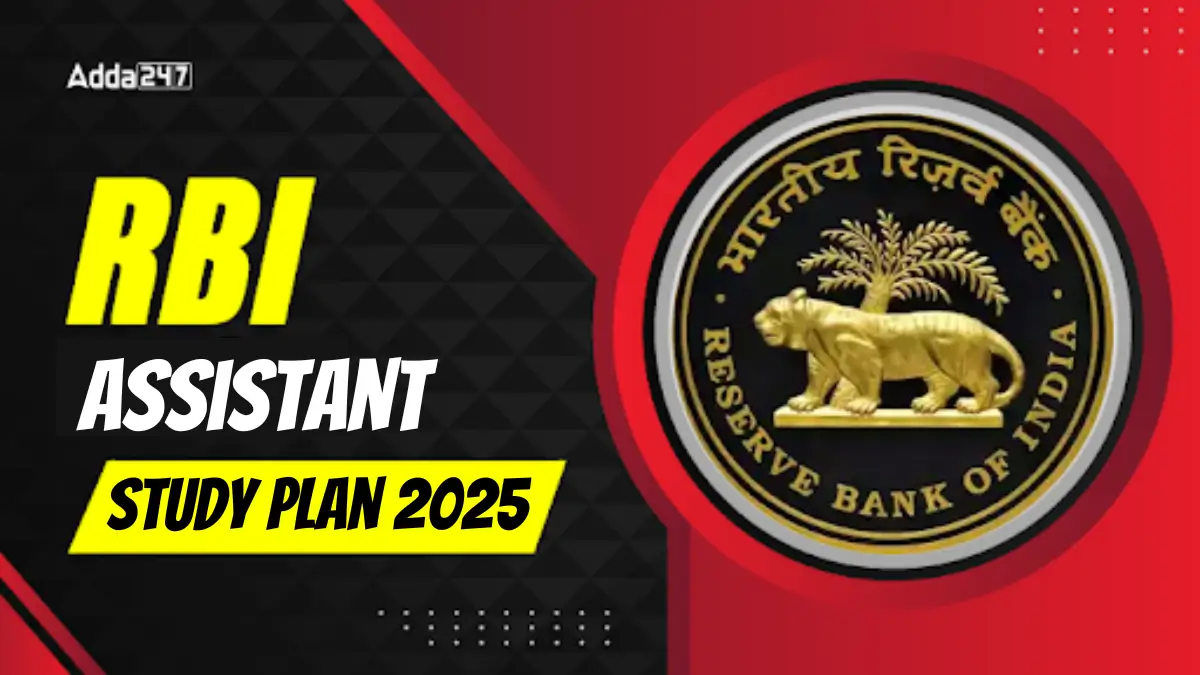Table of Contents
The RBI Assistant Notification 2025 will be released soon on the official website, and now is the perfect time to begin your preparation for the exam. With plenty of time available, starting your preparation today will help you build a strong foundation to successfully clear the exam. Adda247 is here to guide you step by step and provide you with a detailed RBI Assistant Study Plan 2025.
RBI Assistant Study Plan 2025
The RBI Assistant 2025 exam demands a strategic and focused approach to preparation due to its competitive nature and comprehensive syllabus. With multiple stages Prelims and Mains candidates need to manage their time, cover all key topics, and consistently work on improving their weaknesses. This study plan outlines a clear roadmap to help you navigate through the syllabus, focus on high-priority areas, and achieve success in both the Prelims and Mains exams. Below are some plan which will be of great help in your preparation.
RBI Assistant Prelims Preparation Plan
The RBI Assistant Prelims exam is the initial hurdle in the selection process, designed to assess a candidate’s basic skills in key areas such as English Language, Reasoning Ability, and Numerical Ability. Since the preliminary exam is only for 60 minutes and consists of 100 questions, time management is important.
English Language (30 questions, 30 marks, 20 minutes)
Focus Areas: Reading comprehension, error spotting, sentence improvement, and vocabulary.
Plan: Practice 2-5 passages daily for reading comprehension. Work on error-spotting and sentence correction exercises every alternate day. Improve vocabulary by learning 10 new words daily and revising them. Along with this, solve questions of the remaining topics as well.
Reasoning Ability (35 questions, 35 marks, 20 minutes)
Focus Areas: Puzzles, seating arrangements, blood relations, coding-decoding, and syllogism.
Plan: Solve 5-8 puzzles or seating arrangement questions daily. Dedicate alternate days to practicing other reasoning sections such as coding-decoding and syllogism. Focus on speed; solve easier questions quickly to allocate time for more complex ones. Along with this, solve questions of the remaining topics as well.
Numerical Ability (35 questions, 35 marks, 20 minutes)
Focus Areas: Simplification, data interpretation, number series, profit & loss, average, percentage, and time & work.
Plan: Work on quick calculations and learn approximation techniques. Practice 5-10 data interpretation sets per day. Do 20-25 questions daily from topics like percentage, average, and time & work.
RBI Assistant Mains Preparation Plan
The Mains exam is more extensive, with 200 questions across five sections and a total duration of 135 minutes. This means you need to manage both time and accuracy efficiently.
English Language (40 questions, 40 marks, 30 minutes)
Focus Areas: Reading comprehension, error spotting, sentence rearrangement, and vocabulary.
Plan: Practice at least 2 & if possible then 5 passages daily. Dedicate time to grammar-based questions (error spotting and sentence improvement) and vocabulary building.
Reasoning Ability (40 questions, 40 marks, 30 minutes)
Focus Areas: Puzzles, seating arrangements, coding-decoding, and blood relations.
Plan: Solve at least 5-7 puzzles every day to improve speed and accuracy. Regularly practice coding-decoding and blood relations.
Computer Knowledge (40 questions, 40 marks, 20 minutes)
Focus Areas: Basic computer fundamentals, MS Office, Internet, and computer terminology.
Plan: Revise basic computer concepts daily, focusing on key terms and definitions. Complete 2-5 computer knowledge quizzes every alternate day to reinforce your learning.
General Awareness (40 questions, 40 marks, 25 minutes)
Focus Areas: Current affairs (last 6 months), banking and financial awareness, and static GK. All these topics You can find on Adda247 Current affairs and Banking awareness also.
Plan: Read newspapers daily (preferably in the morning) for current affairs. Subscribe to banking awareness magazines or Adda 247 app for updates on financial policies. Revise static GK topics every week.
Numerical Ability (40 questions, 40 marks, 30 minutes)
Focus Areas: Data interpretation, simplification, time & work, percentage, and profit & loss.
Plan: Practice data interpretation sets frequently, at least 2-3 times a week. Work on simplification and approximation regularly to increase your calculation speed.
General Tips for Both Prelims and Mains
To follow these plans you must first complete the course. All the preparation tips which you can start easily by follow the study tips which is given below
Complete Your Syllabus
Prelims Syllabus: Start by covering the Reasoning Ability, Quantitative Aptitude, English Language, and General Awareness sections. Break down the syllabus into smaller chunks, and set a timeline for each topic.
Mains Syllabus: Along with Prelims preparation, keep studying the Computer Knowledge and Descriptive Writing sections, as these will be important for Mains. Make sure to review the General Awareness and Financial Awareness regularly.
Clear Your Weak Points
During your preparation, you’ll encounter areas where you struggle the most. These could be specific sections within reasoning, quant, or English, or certain topics under the Mains syllabus. Make sure to create a mistake notebook and note down all your mistakes in your mistake book
How to identify weak points & improvements tips: Take regular practice tests to spot your weak areas or use previous year’s papers to analyze your mistakes. For weak topics in Quantitative Aptitude, practice simple problems first and gradually move to advanced topics. For Reasoning, practice puzzles and seating arrangements regularly. In English, focus on vocabulary and sentence formation. For ESI, make sure to follow current events and understand key government initiatives.
Note Down Your Mistakes
Keep a dedicated notebook or digital document to track all your mistakes. After each practice session, review the answers, especially the ones you got wrong, and write down what went wrong. Whether it was a calculation error, misinterpretation of the question, or a conceptual gap, make sure to note it.
Review regularly: Go back to your notebook weekly and assess how much progress you’ve made in avoiding past mistakes. This will boost your confidence and help you avoid similar errors in future tests.
Advanced Practice and Mock Tests
Once you’ve completed your basic preparation and mastered key topics, start taking mock tests to simulate the exam experience. Take at least 2-3 full-length mock tests every week to simulate exam conditions and increase the number of mocks as the exam comes closer. This will help improve time management and problem-solving speed.
Why mock tests are important: They help you get used to the exam format and time constraints. They allow you to evaluate your speed, accuracy, and stamina. They help identify the areas where you need to focus more.
How to make the most of mock tests: Take at least 2-3 mock tests per week. After completing a mock, spend time analyzing your performance. Break down each section to understand what went right and where you went wrong. Practice more tests in the areas where you need improvement. Gradually increase the difficulty of your mock tests to build your ability to handle tougher questions.
Start Preparation for Mains Along with Prelims
While preparing for the Prelims, start incorporating topics from the Mains syllabus, especially for Computer Knowledge and Economic & Social Issues (ESI).
Why start early: This will ensure that you’re not rushed when the Mains exam arrives. It gives you enough time to thoroughly understand complex topics like Economic & Social Issues, which require ongoing awareness of current events.
The Prelims and Mains exams are quite close, so having an early start will prevent you from falling behind.
Time Management: Dedicate a few hours each week exclusively for Mains topics, and use your regular preparation time for Prelims. This balanced approach keeps both exams in focus.
Give Attention to Most Asked Topics
Give Attention to Most Asked Topics Focus on high-weightage topics that appear frequently in the exam.
Quantitative Aptitude:
Number Series: Practice identifying patterns and solving series questions quickly.
Data Interpretation: Work on graphs, pie charts, and data sets to interpret data quickly.
Simplification and Approximation: Master these topics for quick calculation in exams.
Reasoning:
Puzzles: Solve different types of puzzles (seating arrangement, blood relations, etc.).
Syllogism: Practice logical deductions and inferences.
General Awareness:
Stay updated on Current Affairs related to banking, economics, sports, and politics. Focus on Banking Awareness, including terms, abbreviations, and important banking schemes.
English Language:
Reading Comprehension: Practice different types of passages and understand the techniques to answer questions efficiently.
Error Spotting: Regularly practice grammar-based questions and sentence correction
| Related Posts | |
| RBI Assistant Syllabus | RBI Assistant Previous Year Papers |
| RBI Assistant Cut Off | RBI Assistant Salary 2025 |




 How to Score 18+ Marks in the English La...
How to Score 18+ Marks in the English La...
 30 Days Study Plan to Crack SBI Clerk 20...
30 Days Study Plan to Crack SBI Clerk 20...
 SBI Clerk Mains Exam Preparation Tips 20...
SBI Clerk Mains Exam Preparation Tips 20...





